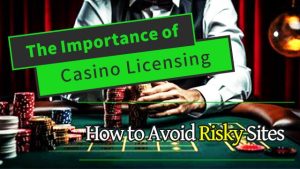The online casino industry has grown rapidly over the past decade, offering players worldwide the thrill of real-money gaming from home. However, this popularity has also attracted scammers. Thousands of players every year report losing money to fraudulent casinos, fake websites, or rigged games. Searching for “online casino scam” has become more common than ever, as players want to know how to stay safe.
This article will explain how online casino scams work, common warning signs, and what you can do to avoid becoming a victim.
What Is an Online Casino Scam?
An online casino scam is any fraudulent activity where players are tricked into depositing money without fair chances of winning or receiving payouts.
Unlike legitimate casinos that hold licenses from regulators (such as Malta Gaming Authority, UK Gambling Commission, or Curaçao eGaming), scam casinos often operate without oversight. They may offer flashy bonuses and games but disappear once you request a withdrawal.
Key difference:
- Licensed casinos follow strict rules, use certified RNGs (random number generators), and offer real customer support.
- Scam casinos focus on taking deposits and making withdrawals nearly impossible.
Types of Online Casino Scams You Should Know
Fake Online Casinos With No Payouts
Some scam sites look like real casinos but never process withdrawals. Players can deposit easily, but when they try to cash out, their accounts are blocked.
Rigged Games With Unfair Algorithms
Legitimate casinos use certified software from providers like NetEnt, Evolution, or Pragmatic Play. Scam casinos often run unverified games designed to make winning impossible.
Bonus Traps and Unrealistic Wagering Requirements
A common scam tactic is offering a huge welcome bonus—like 500% up to $5,000—but with unrealistic wagering requirements (e.g., 100x or more). Players never reach the conditions, and their winnings are voided.
Identity Theft and Payment Fraud
Some scam casinos ask for excessive documents, then misuse personal data. Others use insecure payment methods, putting credit cards or e-wallet accounts at risk.
Phishing Websites Imitating Real Brands
Fraudsters sometimes create fake websites that mimic trusted casinos. A single letter in the domain name might be different, but the goal is to steal deposits and personal information.
Warning Signs of a Scam Casino
When evaluating a casino, watch out for these red flags:
- No valid license or regulation: Always check the footer of the website for a license number.
- Suspicious payment methods: If only crypto wallets or obscure processors are available, be cautious.
- Unrealistic bonuses: “Deposit $10 and get $1,000” usually means a trap.
- Negative player reviews: Forums like Trustpilot or AskGamblers often reveal scam complaints.
- Hidden terms and conditions: Scam sites bury unfair rules deep in the fine print.
Real-World Examples of Online Casino Fraud
Over the years, watchdog sites have documented multiple scam casinos.
- Some sites operated for a few months, collected deposits, then shut down overnight.
- Others ran for years but never paid out significant wins.
- Forums are full of reports from players who deposited small amounts, only to be denied withdrawals for vague “bonus abuse” or “verification issues.”
These real-world examples show that scam casinos are not rare—they’re a persistent problem in the industry.
How to Protect Yourself from Online Casino Scams
Here are practical steps to stay safe:
- Check licensing: Only play at casinos regulated by well-known authorities.
- Verify payment security: Look for SSL encryption (the padlock symbol in your browser).
- Read reviews: Search the casino name + “scam” before depositing.
- Test withdrawals: Start small and see if payouts are processed quickly.
- Stick to reputable brands: Well-known casinos with years of operation are less risky.
Recommended! Betgoat Casino with Super-Fast Deposits and Withdrawals

If you’re the type who thinks “The faster the deposits and withdrawals, the better!”, then the latest online casino launched in 2025 — BETGOAT Casino — is highly recommended.
Betgoat Casino is a crypto-specialized online casino and sportsbook that supports 14 types of cryptocurrencies. Deposit processing takes less than 10 minutes, and withdrawals are completed in about 10 mininutes, making it far more stress-free compared to most other online casinos.
What’s more, in most cases, no identity verification is required, making it a great option for those who value privacy and anonymity.
Register for Betgoat Casino for Free
What to Do If You Get Scammed by an Online Casino
Unfortunately, many players only realize too late. If it happens:
- Report to the licensing authority (if any exists).
- Contact your payment provider or bank to dispute transactions.
- Warn others by posting your experience on forums.
- Explore legal options: In some cases, consumer protection agencies can help.
Top Safe Alternatives: Trusted Online Casinos
Instead of gambling on unknown sites, choose casinos that have proven reputations.
Safe online casinos typically have:
- A valid license (MGA, UKGC, Curaçao, etc.)
- Transparent terms and conditions
- Fast withdrawals and multiple payment methods
- Positive community feedback
Examples of trusted platforms include big international names that have been operating for over a decade.
Conclusion: Stay Safe While Playing Online
Online casino scams are a serious risk, but with the right knowledge, you can avoid them. Remember:
- If a bonus looks too good to be true, it probably is.
- Always check for licenses and read reviews.
- Protect your money by sticking to trusted casinos.
By recognizing the warning signs, you can enjoy online gaming responsibly—without falling victim to fraud.


